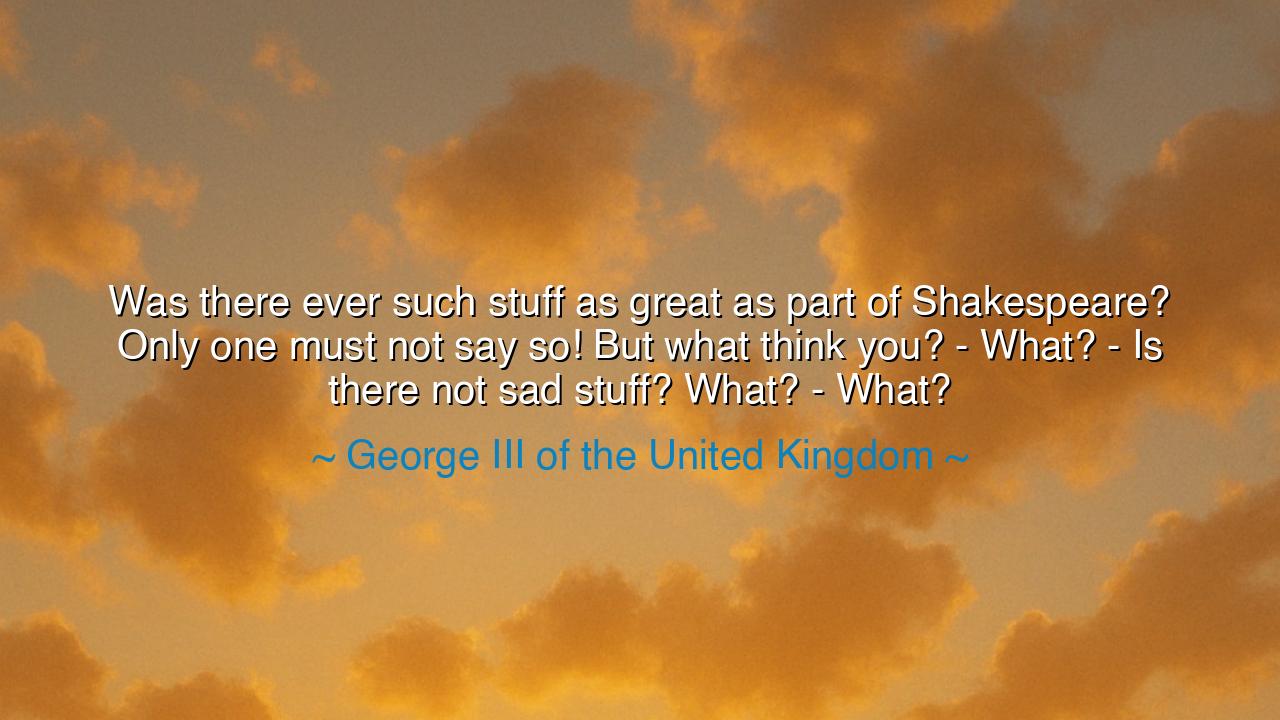
Was there ever such stuff as great as part of Shakespeare? Only
Was there ever such stuff as great as part of Shakespeare? Only one must not say so! But what think you? - What? - Is there not sad stuff? What? - What?






The words of George III of the United Kingdom are at once halting and profound: “Was there ever such stuff as great as part of Shakespeare? Only one must not say so! But what think you?—What?—Is there not sad stuff? What?—What?” In this fragmented outburst, we glimpse not merely a king musing on literature, but a troubled spirit grappling with the heights and depths of human expression. His words are scattered, filled with hesitation and repetition, as though he sought clarity and could not grasp it. And yet, in their brokenness, they reveal an eternal question: can even greatness contain flaws, and can we admit such truths aloud?
The origin of this quote lies in the later years of George III, when his mind was clouded by illness, and his reign burdened by loss. Shakespeare, the bard of England, was revered almost as a prophet of human nature, his works celebrated as untouchable. For a king—especially one already marked by instability—to question Shakespeare’s perfection was near heresy. And yet George dares to ask: is all of it truly great? Or is some of it “sad stuff,” too heavy, too flawed, too broken? His questioning reflects not only his state of mind, but the deeper human struggle between reverence and honesty.
Consider the tale of Socrates, who, though surrounded by poets and statesmen, often asked questions that pierced the veil of convention. While the Athenians celebrated their poets as divine, Socrates dared to question whether their words always held wisdom, or whether beauty sometimes disguised emptiness. For this courage to question what others took as sacred, Socrates was condemned. George III, though not in a philosopher’s robe but in a king’s crown, echoes this same tension: the pull between worship of greatness and the freedom to ask whether greatness might also err.
His words also remind us of the fragility of the human mind. George III’s reign was long and marked by both achievement and decline, but his struggles with mental illness became his most remembered legacy. In this fragment, his broken rhythm mirrors his broken thoughts, and yet, within it lies truth. Even in confusion, he touches on something essential: that even the greatest human creations are not beyond scrutiny. Shakespeare himself, who painted both kings and beggars, fools and sages, would perhaps have smiled to hear a king struggle over his words, for it embodied the very humanity his plays sought to reveal.
But there is also a warning hidden here. George III laments, “Only one must not say so!” Here is the eternal conflict between truth and convention. Society often demands silence before its idols, whether they be men, books, or institutions. To question them is to risk being cast out, or worse, misunderstood. Yet silence breeds stagnation, while honest questioning gives birth to growth. The king’s hesitant stammer becomes, in a way, an act of bravery—a crack in the wall of unquestioned reverence.
From this we learn that even the voices of the unstable may carry wisdom, and that truth can emerge even in broken speech. We must not despise the stumbling questioner, for often their questions contain the seeds of what others fear to ask. George III’s fragmented critique of Shakespeare is less about tearing down the bard than about reminding us: all human work is mixed with both brilliance and frailty. To pretend otherwise is to place humanity upon false pedestals.
The lesson we take is clear: question with humility, but do not fear to question. Do not let convention silence the pursuit of truth. Whether in art, politics, or daily life, dare to look upon greatness with honest eyes. See both the heights and the shadows, and honor both as parts of the whole. Practically, this means when you encounter works, leaders, or traditions revered by all, do not simply bow to them—engage with them. Study them deeply, admire their strengths, and acknowledge their flaws. In this way, you honor them more truly than blind worship ever could.
Thus, the broken musings of George III become not madness alone, but a teaching for future generations: even in reverence, let there be honesty; even in admiration, let there be truth. For to see both the glory and the weakness of human creation is to walk the path of wisdom, where neither idol nor cynicism rules, but where understanding and humility shine like guiding stars.






AAdministratorAdministrator
Welcome, honored guests. Please leave a comment, we will respond soon